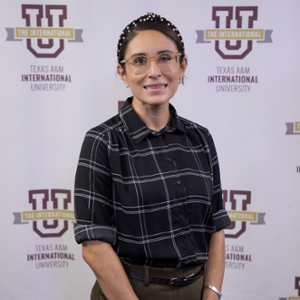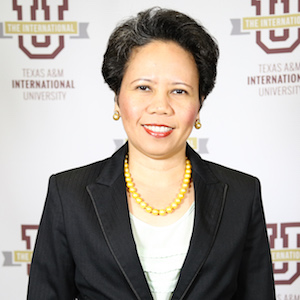Pandemic Helping to Drive Interest In Public Health Careers, Says TAMIU

While the COVID-19 Pandemic has impacted so many, it has also increased awareness about the importance of Public Health…and the diverse career opportunities it makes possible.
Texas A&M International University (TAMIU) assistant professor of Public Health Dr. Cindy Lynn Salazar-Collier said the shared Pandemic experience has helped to drive interest in the University’s Bachelor of Science degree in Public Health (BSPS).
“We launched our program in the Fall of 2020 and have doubled our enrollment since. Public health works to prevent illness rather than curing it. Prevention is far more effective and affordable than a cure. The Pandemic has affirmed this, acting as a catalyst to boost awareness of the importance of Public Health,” Dr. Salazar-Collier observed.
Interest in Public Health programs has jumped not only at TAMIU, but is part of a trend mirrored across the nation. Many feel that the increased visibility given to public health and its focus on prevention is helping to fuel this interest. Salazar-Collier reinforced this.
“The field of public health differs from the medical field – or individually-focused health care; public health focuses on preventing illness and promoting health, and well-being at the population level. The five main fields within Public Health are Biostatistics, Epidemiology, Health Promotion, Behavioral Sciences, and Environmental Health and Public Policy… so there are broad career options,” she said.
Dr. Marivic Torregosa, TAMIU dean of the College of Nursing and Health Sciences, home of the BSPH program, concurred.
“Our program provides students the opportunity to develop an interdisciplinary perspective to address social determinants of health. Nursing, psychological, sociological, behavioral approaches to health disparities, health care delivery systems, contextual and environmental factors -- all facilitate the development of innovative strategies that can impact positive changes in health promotion, especially in vulnerable border communities with reduced access to health resources,” Dr. Torregosa said.
Salazar-Collier affirmed program distinctions which she says help to offer TAMIU students real advantages.
“All required coursework is online except for the completion of practicum hours with eight varied health organizations across Laredo. The Public Health program has a new partnership with the University of Texas Health Science Center at Houston School of Biomedical Informatics (UTHealth SBMI) to implement the Development of Informatics Accelerated Learning in Laredo (DIALL) program. DIALL provides TAMIU students the opportunity to complete a 4+1 graduate certificate and accelerated master’s program with UTHealth SBMI. At completion, students graduate with a Bachelor's degree from TAMIU and a graduate certificate from UTHealth SBMI,” she explained.
Salazar-Collier said Biomedical Informatics is a dynamic field with rich employment opportunities.
“It’s a growing field that optimizes the use of information in health care with employment opportunities in pharmacies, hospitals, insurance companies, and more. Of additional interest, 4+1 program graduates have the opportunity to continue their coursework with UTHealth SBMI and earn their master’s in Biomedical Informatics in just one year,” she said.
SBMI is one of six schools of the UTHealth Science Center at Houston System, and the only academic Biomedical Informatics program in Texas. It’s also the only free-standing school among 70 related programs in the nation, and one of the largest globally.
Torregosa said the BSPH program’s interdisciplinary approach yields graduates that can tap into an equally diverse spectrum of career opportunities.
“This is a degree program that truly offers a broad spectrum of careers for graduates. These include community health educators, health specialists, health navigators, epidemiologists, policymakers, public health administrators, health promotion experts, sanitarians, research assistants, researchers, and scientists, to name a few,” Torregosa explained.
Additionally, graduates can also move on to complete graduate programs, Salazar-Collier noted.
“Students graduating with a BCSP can move on to complete graduate programs in public health (MPH, MS, PhD, or DrPH); medical school (MD or DO), law school (JD), dental school (DDS or DMD), professional degrees in allied health (pharmacy, physical therapy, etc.) and others,” she noted.
Salazar-Collier observed that for many the Pandemic has offered a true call to action, something that the study of Public Health can drive. She said TAMIU students are uniquely qualified to do this.
“TAMIU students are in a special position to play a pivotal role in this field, as most of our students represent a minority population with health disparities. Our students provide a unique perspective to the influences of health for an underserved, Texas-México bordertown population. They also can interpret and understand the story that public health data of these populations convey, something other public health researchers may not truly understand. Finally, they have insight into how to reach these populations in a way that will truly resonate with community members. This ability gives our students the potential to be true agents of change in the future health of the Laredo community,” she said.
Salazar-Collier said that the University’s upcoming observance of National Public Health Week, April 4 - 10, 2022, provides an opportunity for students to understand the impact and importance that Public Health drives daily. That observance will include virtual events for students including healthy meal awareness, mental health awareness, practicing clean eating, and a Public Health movie night, among other activities.
“We have learned much and will most certainly continue to learn from the globally shared Pandemic experience. Foremost is the realization that Public Health must drive public policy focused on the health and well-being of all communities everywhere,” she concluded.
For additional information on TAMIU’s Public Health degree, visit https://www.tamiu.edu/conhs/publichealth.shtml, email Dr. Salazar-Collier at cindy.collier@tamiu.edu,or phone 956.326.3279.



